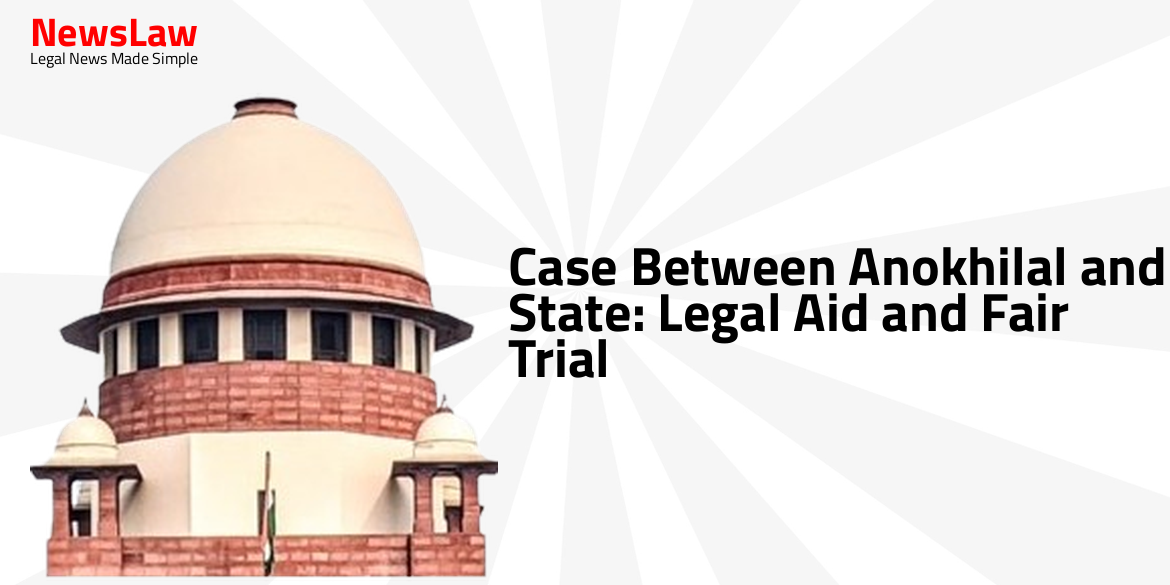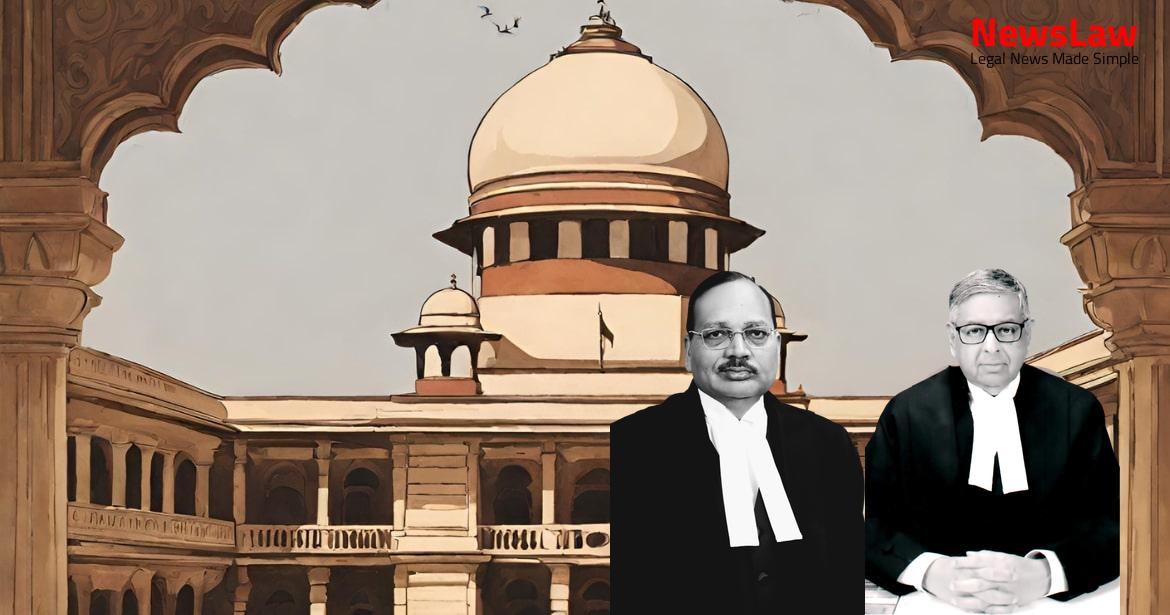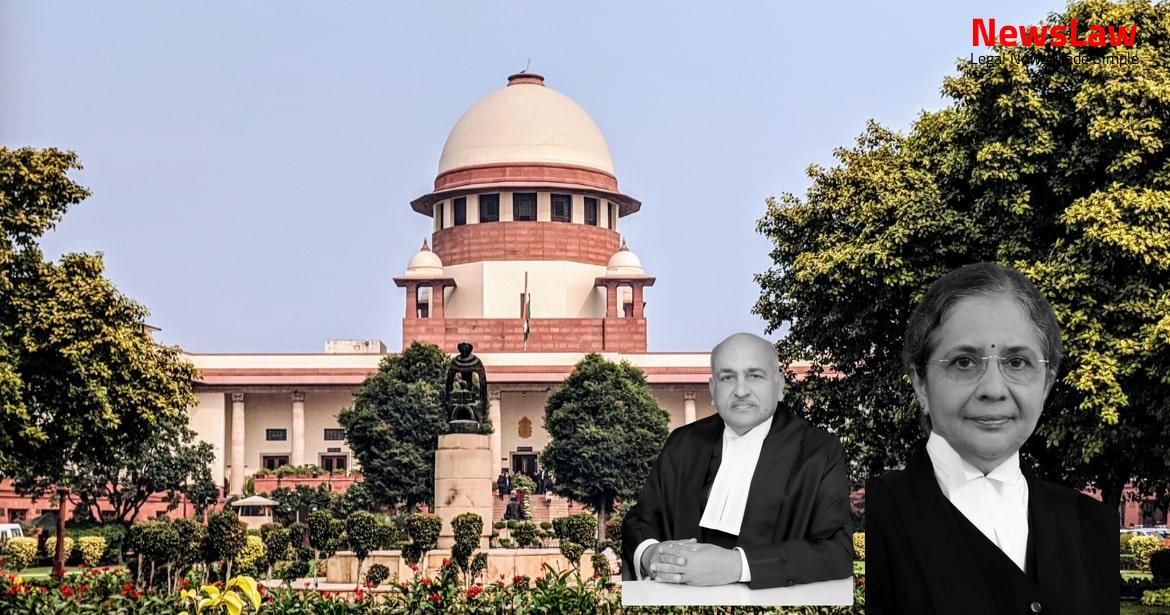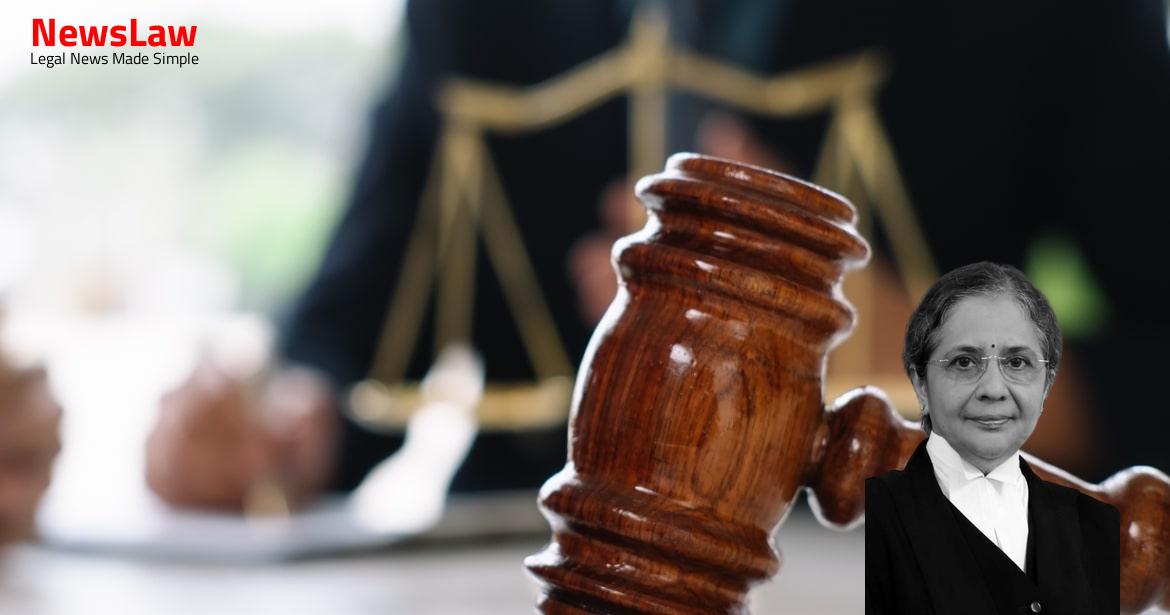In a significant ruling by the Supreme Court of India, the case involving Anokhilal and the State delves into the critical aspects of legal aid and ensuring a fair trial process. The judgment highlights the importance of upholding the fundamental rights of individuals accused of offenses, emphasizing equality and justice. The Court’s decision sets a precedent for the future application of legal assistance in criminal cases, ensuring that justice is served without compromise.
Facts
- The report from the DNA Finger Printing Unit connects the accused with the crime.
- Immediate charge-sheet submission after the arrest of the accused.
- Quick trial from 19 February to 02 March, 2013.
- Thanks for the assistance of the defense for ensuring a speedy trial.
- Registration of Criminal Reference No.4/2013 for confirmation of death sentence.
- Appeal filed by the appellant challenging conviction and sentence.
- High Court affirmed Trial Court’s decision and upheld death sentence.
- Attempts made to get in touch with the accused by the advocate.
- Present case considered as ‘rarest of rare’ due to circumstances and accused’s prior conviction.
- Application rejected despite defense’s objection.
- Hearing for all appeals began on 04.12.2008.
- Mandatory exercise as per the Supreme Court Legal Services Committee’s directions.
- No separate sentence for Protection of Children from Sexual Offences Act, 2012 violation.
- Defense has no objections to the documents being taken on record.
- Adjournment of matters requested to arrange for videoconferencing with the accused.
- Accused was not seen alone after the incident as he absconded.
- Last seen alive with the accused by Kirti Bai, placing them in proximity to the crime.
- Mr. Shikhil Suri appeared for the accused in both cases.
- Accused Anokhilal son of Sitaram convicted under various sections including Section 302 IPC and sentenced to death.
- High Court allowed an appeal after six years and remanded the case for retrial.
- Six accused sentenced to death but later appeals were filed by accused and the State seeking different outcomes.
- Court observed that some accused were deprived of the opportunity to be heard during the appeals.
- Accused convicted under multiple sections including Protection of Children from Sexual Offences Act, 2012.
- Trial Court amended the charge to which accused pleaded not guilty, and witnesses were examined.
- Sentence of imprisonment to run concurrently, and accused sentenced to death by hanging.
- Separate orders of sentence pronounced for different offences.
Arguments
- The appellant argued that the belated appointment of counsel by the Sessions Judge deprived him of adequate legal aid, hindering his proper defense.
- The appellant contended that the procedure followed by the court was not in accordance with the law and may result in a breach of his fundamental rights under Article 21 of the Constitution.
- The appointed counsel for the appellant was not given sufficient time to prepare the defense as no record indicated so.
- Mr. Varun Chopra, Deputy Advocate General argued for the State
- He stated that the evidence clearly indicated the guilt of the accused
- He supported the order of conviction by the lower Courts
- He emphasized that there was no need for any interference in the conviction
Also Read: CRPF Act: Validity of Rule 27 for Compulsory Retirement – Case of Head Constable vs. CRPF
Analysis
- The court emphasized the importance of providing sufficient time to the Amicus Curiae to prepare the defense in each case.
- The judgment highlighted the failure to comply with the rule of providing adequate time to the Amicus Curiae for trial preparation.
- It noted that in the present case, the Amicus Curiae was appointed on the same date as the charges were framed, limiting their ability to fulfill their role effectively.
- The court pointed out the essential duty of the Trial Court to grant ample time for the Amicus Curiae to study the case and interact with the accused.
- Concern was raised regarding the confusion around DNA reports and FSL reports which significantly impacted the trial process.
- The judgment mentioned the significance of facilitating dialogue between the counsel and the accused for a fair trial, advocating for video-conferencing facilities for legal aid in criminal cases.
- It cited previous cases where insufficient time given to the Amicus Curiae was considered a breach of the accused’s right to adequate defense preparation.
- The principle of providing free legal aid and fair trial under Article 39-A of the Constitution was reiterated.
- The directive to extend real and meaningful assistance to the accused through legal aid services was underscored.
- The court emphasized on the need for full opportunity at every stage, especially in cases involving life imprisonment or death sentence.
- The judgment highlighted the importance of recording evidence through video-conferencing to expedite trial processes.
- It stressed the obligation of the court to ensure a just and speedy trial, considering the gravity of the offences charged against the accused.
- The accused has been sentenced to death.
- According to Section 366 Cr.P.C., the death penalty should not be executed until confirmed by the High Court.
- Section 366(2) Cr.P.C. directs the handing over of the accused sentenced to death to the custody of the jail.
- The right to free legal services is an essential component of a fair and just procedure for individuals accused of offenses, implicit in Article 21 of the Constitution.
- Article 39-A of the Constitution emphasizes on equal justice and free legal aid, ensuring justice is not denied based on economic or other disabilities.
- The State is mandated to provide free legal aid to an accused person if circumstances and justice require, provided the accused does not object.
- Exceptions to free legal aid may dilute the fundamental right guaranteed under Article 21, impacting cases like terrorism.
- Failure to provide free legal assistance can lead to a violation of the accused person’s fundamental right under Article 21 of the Constitution.
- The principle of fair trial is crucial and should not be compromised, ensuring justice is not sacrificed while expediting the legal process.
- Legal services should be provided to eligible individuals at all stages of proceedings, without distinction between trial and appellate stages.
- The basis of a criminal trial is the search for truth and justice, not technicalities, to protect the innocent and punish the guilty.
- The balance between an accused’s right to speedy trial and societal impact of the crime must be weighed, ensuring justice is not delayed unjustly.
- The Court’s duty is to ensure justice is served fairly, without violating due process, by conducting trials that are real and not farcical.
- No hard and fast rule in this context
- Judgments of conviction and orders of sentence passed by the Trial Court and the High Court set aside
- Directing de novo consideration
- Interactions may prove helpful as noticed in Imtiyaz Ramzan Khan
Also Read: DAMEPL vs. DMRC: Curative Petition and Arbitral Award Restoration
Decision
- The accused is informed of the right to appeal and the period of appeal according to Section 363(4) Cr.P.C.
- In matters concerning the confirmation of death sentences, Senior Advocates of the Court should be considered as Amicus Curiae.
- A minimum of seven days’ time is usually considered appropriate before proceeding further.
- The matter is to go back to the tribunal for reevaluation.
- Appreciation and gratitude expressed for the assistance provided by Mr. Luthra, the learned Amicus Curiae.
- Request made for Mr. Luthra to assist the Court in deciding other issues as per previous Orders.
- Substantive appeals stand disposed of, with a listing scheduled for 18.02.2020.
- Order of conviction and sentence passed by the Special Court and the High Court are set aside for a de novo trial.
- Appellant can request a lawyer under Section 304 of the Criminal Procedure Code or legal aid scheme if not represented by one.
Case Title: ANOKHILAL Vs. THE STATE OF MADHYA PRADESH
Case Number: Crl.A. No.-000062-000063 / 2014



